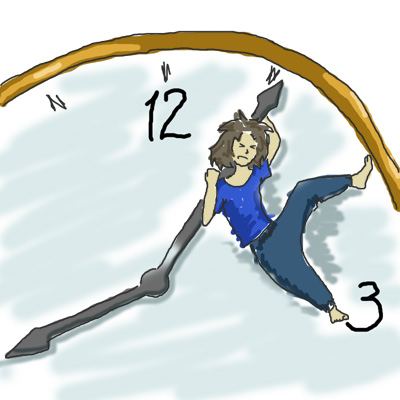This post is also available in Dutch .
Do you remember you have to set the clocks back by one hour this weekend? This is the highlight of October, an hour of extra sleep! So, how does changing the clock affect your brain?
 Picture by Alina
Picture by Alina
Every spring we set our clocks an hour forward, and in the fall we set them back again. Summer time (also called Daylight Saving Time) and winter time (also called Standard Time) were introduced primarily for economic reasons. Incandescent light bulbs used to be the only electrical devices in the home. Therefore, having people get up earlier in the morning meant they could take advantage of the early morning daylight and consume less energy for lighting. Nowadays, the first thing people power up in the morning are their laptops or coffee makers, so the effect of summer and winter time adjustment on the electricity bill has become relatively minor. Some people claim that adjusting the clocks does more harm than good because it disturbs our sleep schedules, arguing for the practice to be abandoned. Is there scientific evidence for this argument?
Rewinding vs forwarding the clock
It appears that people do not have much trouble adapting to winter time in the fall. A study on sleeping patterns, after clocks were adjusted backward in October, found that people had correctly adjusted their waking times, and that sleep quality had not decreased. Setting the clocks an hour forward appeared to be more troublesome. During the week in which clocks were adjusted forward people had difficulty falling asleep; their sleep was less efficient and they ended up getting out of bed later instead of earlier in the morning.
Sunrise and the biological clock
People typically align their time for waking up with the time at which the sun rises (at least on the days they can sleep in). A study found that the moment at which one wakes up tends to vary with sunrise time, especially during winter. Here, the time to wake up gradually becomes later between October and December, and slowly shifts back as the days begin to lengthen. In the summer, however, this process stops. Between April and October, there is little variation on when we wake up, on average it is between seven-thirty and eight in the morning.
What should I do?
Our brain does not like abrupt changes. The best way to transition effortlessly is to start a few days before the actual clock adjustment: set your alarm a couple of minutes later every day. This would be the most sensible and rational approach, but of course we do not do it. We do not think about the transition until the last moment, we stay up late the night before, and the next day we are late to all of our appointments because we did not properly adjust all of our time devices. Your brain will survive, but this spring you should consider a smoother transition. For now though, definitely enjoy your extra hour of sleep, good night!
More information
Article on daylight saving time and your sleep/wake cycle
Article on daylight saving time and your biological clock
This blog was written by Alina and can be read in Dutch here.
Translated by Renske Hoedemaker.
